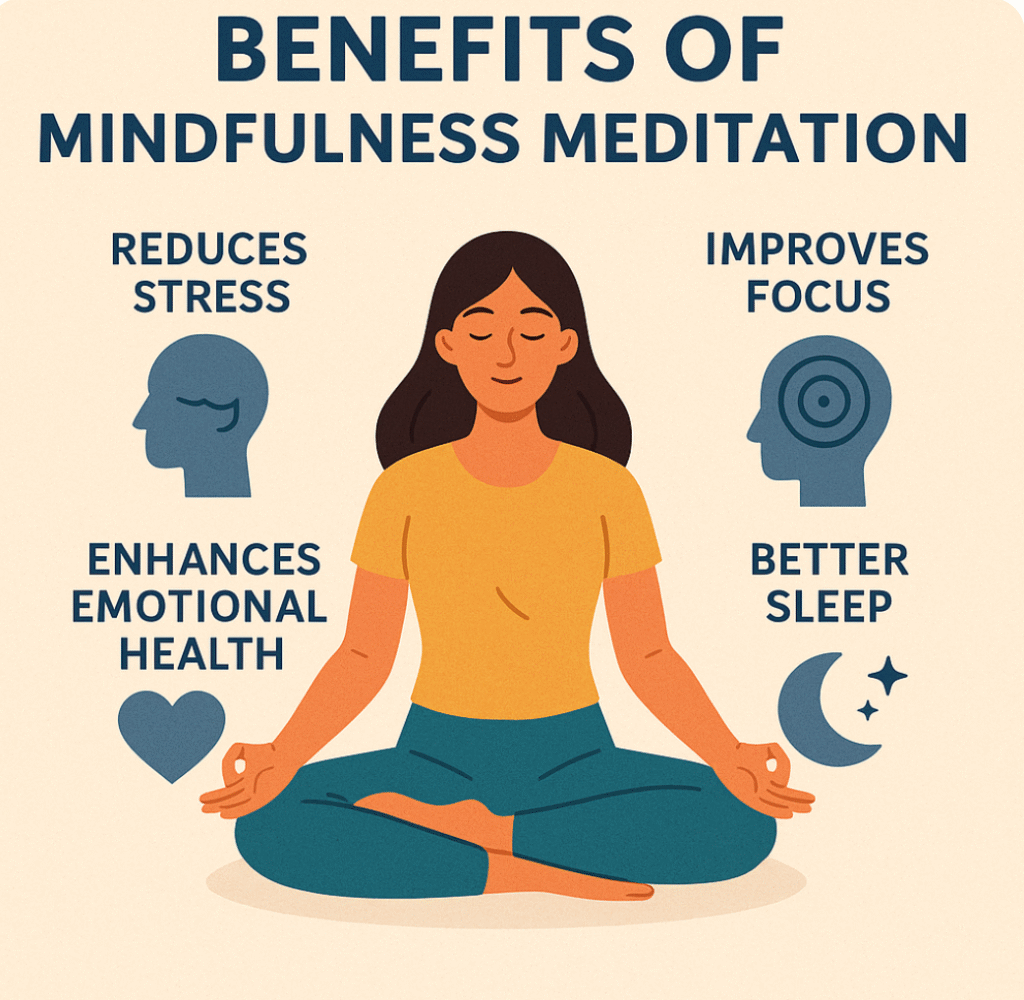Introduction
In today’s fast-paced digital world, stress, anxiety, and burnout have become common companions in our daily lives. Amidst this mental chaos, mindfulness meditation has emerged as one of the most scientifically supported tools for restoring mental clarity, emotional balance, and overall well-being. Rooted in ancient Buddhist traditions yet validated by modern neuroscience, mindfulness offers a simple yet profound way to reconnect with the present moment — a space where calm and awareness coexist.
What Is Mindfulness Meditation?
Mindfulness meditation is the intentional practice of focusing one’s attention on the present — observing thoughts, feelings, and sensations without judgment. It trains the brain to stay aware of the “now,” rather than being lost in regrets of the past or anxieties about the future.
The most common method involves:
- Sitting quietly and focusing on breathing.
- Observing thoughts and sensations as they arise.
- Redirecting attention gently back to the breath when the mind wanders.
According to the American Psychological Association, mindfulness helps individuals “increase awareness, clarity, and acceptance of present-moment reality.”
Scientifically Proven Benefits
1. Reduces Stress and Anxiety
Dozens of studies confirm that mindfulness lowers levels of cortisol — the body’s stress hormone. A 2019 meta-analysis published in JAMA Internal Medicine found that mindfulness-based stress reduction (MBSR) significantly reduces anxiety and improves mood.
Mindfulness helps regulate the amygdala, the brain’s fear center, creating a calmer emotional response to daily stressors.
2. Improves Focus and Cognitive Performance
Mindfulness meditation enhances the brain’s prefrontal cortex and hippocampus, regions responsible for attention and memory. Harvard University research shows that regular practice increases grey matter density, sharpening focus and improving working memory.
3. Supports Emotional Health
By increasing self-awareness, mindfulness fosters compassion and emotional resilience. Practitioners report fewer symptoms of depression and a higher sense of life satisfaction. Emotional regulation improves as individuals learn to observe emotions instead of reacting impulsively.
4. Enhances Sleep Quality
A 2015 study by the University of Southern California found that mindfulness helps treat insomnia by calming racing thoughts. Practicing meditation before bedtime improves sleep latency (the time it takes to fall asleep) and promotes deeper rest cycles.
5. Lowers Blood Pressure and Strengthens the Heart
Mindfulness encourages relaxation and balanced breathing, which lowers blood pressure and heart rate. The American Heart Association recognizes mindfulness meditation as an effective complement to conventional cardiovascular treatments.
Practical Steps to Begin Mindfulness
- Start small: 5–10 minutes daily is enough for beginners.
- Focus on your breath: Observe its rhythm without controlling it.
- Acknowledge distractions: Let thoughts pass like clouds, without judgment.
- Be consistent: Daily repetition builds long-term neurological benefits.
- Use guided sessions: Apps such as Headspace and Calm offer structured audio meditations.
Modern Applications
Mindfulness has transcended spiritual traditions and entered medicine, psychology, and corporate wellness. Hospitals use Mindfulness-Based Cognitive Therapy (MBCT) to prevent relapse in depression, while companies like Google and Apple integrate mindfulness programs to boost employee creativity and focus.
Conclusion
Mindfulness meditation isn’t about escaping life — it’s about fully experiencing it. By dedicating a few minutes each day to stillness, you can reshape how your brain perceives stress, react to emotions, and find meaning in every moment.
🇰🇷 Premium Korean Ginseng Online Shop







